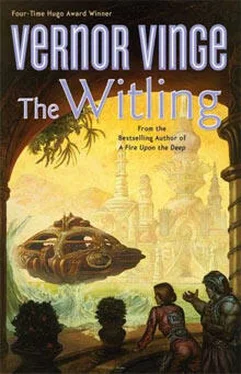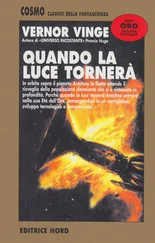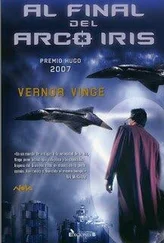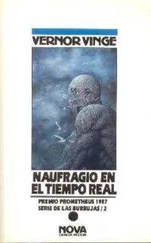Vernor Vinge - The Witling
Здесь есть возможность читать онлайн «Vernor Vinge - The Witling» весь текст электронной книги совершенно бесплатно (целиком полную версию без сокращений). В некоторых случаях можно слушать аудио, скачать через торрент в формате fb2 и присутствует краткое содержание. Город: New York, Год выпуска: 2006, ISBN: 2006, Издательство: Tor Books, Жанр: Фантастика и фэнтези, на английском языке. Описание произведения, (предисловие) а так же отзывы посетителей доступны на портале библиотеки ЛибКат.
- Название:The Witling
- Автор:
- Издательство:Tor Books
- Жанр:
- Год:2006
- Город:New York
- ISBN:0-765-30886-X
- Рейтинг книги:3 / 5. Голосов: 1
-
Избранное:Добавить в избранное
- Отзывы:
-
Ваша оценка:
- 60
- 1
- 2
- 3
- 4
- 5
The Witling: краткое содержание, описание и аннотация
Предлагаем к чтению аннотацию, описание, краткое содержание или предисловие (зависит от того, что написал сам автор книги «The Witling»). Если вы не нашли необходимую информацию о книге — напишите в комментариях, мы постараемся отыскать её.
The Witling — читать онлайн бесплатно полную книгу (весь текст) целиком
Ниже представлен текст книги, разбитый по страницам. Система сохранения места последней прочитанной страницы, позволяет с удобством читать онлайн бесплатно книгу «The Witling», без необходимости каждый раз заново искать на чём Вы остановились. Поставьте закладку, и сможете в любой момент перейти на страницу, на которой закончили чтение.
Интервал:
Закладка:
She had worked eighteen and then twenty hours a day; it was no use. The days passed just as quickly. And more and more, Bjault had been a drag on her progress. The old man tried to keep up with everything she did, to make her explain all the steps and procedures. She was rid of him only when he slept and during those hours he spent working an interminable Runge-Kutta analysis of the plan. At one point he had the entire desk and much of the floor covered with papers bearing his neat, pen-scratched mathematics. In a way, she had to admire Bjault for that: most of Leg-Wot’s contemporaries would be at a complete loss if they couldn’t solve their differential equations on a computer—they would never think of doing something like that by hand. But Bjault had been an adult before the reinvention of digital computers, and when he originally learned his math, numerical analysis had all been done by hand. Still, it was an irritating waste of time; Leg-Wot had told the old man over and over again that his plan would work. She had known that the moment he described the scheme. It wasn’t that she was a mathematical genius—she just had a feel for certain things.
But they had had several things going for them: the Guild’s secret assistance, an endless supply of hand labor, and—through Pelio—the authority of King Shozheru. Eventually they had licked all the preliminary problems; they were ready to begin the first, and safest, part of Ajão’s plan.
The boat’s warning whistle sounded. Leg-Wot slid back into her chair and pulled her harness tight. All along the deck, the crew took their places, while beside her Ajão and Pelio tied themselves in, too. The boy was nervous and tired; he had been up most of the night trying to get a couple of extra pilot-navigators. Pelio gave Yoninne a quick, nervous smile, and looked across the deck at the chief navigator. The navigator was an especially husky Azhiri dressed in baggy coveralls. The fellow never looked directly at Ajão or Yoninne, though he showed stiff courtesy to the prince. No doubt he thought Pelio was running from disgrace. The guy reminded Leg-Wot of her father: a hardcore officer willing to cooperate with his superiors’ most idiotic whims.
The navigator had been a hard man to get. Only selected combat types ever made the pilgrimage across the arctic. It had taken Shozheru’s authority to pry him away from Summer’s army. But without him and the two other navigators, they would have to take on local pilots for at least part of their journey.
Now the man’s heavy face tensed for an instant—and the first jump was accomplished. A dozen different impressions assaulted Leg-Wot’s senses at once. There was a moment of free fall as the boat rose up and eastward. Then she was pressed firmly back into her seat, and the boat’s timbers groaned as the yacht smashed into the destination lake. Suddenly the day was bright and cheerful, for there were only scattered clouds in this new sky.
But that was only a single jump, the first of more than a hundred. Minutes later they teleported again, and jump followed jump, till their surroundings became a surreal blur in Leg-Wot’s memory. The skies stayed mostly sunny, and the warehouses at water’s edge looked pretty much the same from lake to lake, but the landscape beyond them flickered from grassy plain to city, to mountains. The sun edged jerkily southward as they traveled further into the northern reaches of the Summerkingdom. Traveling by “road boat” was like a pleasant combination of flying and sailing. It was strange to remember how frightening and mysterious their first ride on one had been. Now, even that crazy boat whistle seemed both sensible and commonplace: it blew when their navigator renged air from their next destination into its chamber—the air’s relative speed somehow determined the pitch of the whistle, so it was easy to estimate how much of a lurch to expect.
Two hours passed, and they stopped at a place Pelio called Pfodgaru. It was lunch time. They were pulled into a wharf and pots of steaming soup were brought aboard. Leg-Wot watched Bjault as the food was passed around. The archaeologist had been unnaturally quiet all morning; there had been none of the usual penetrating questions, none of the theories thrown off the top of his head. Now he fiddled with his soup, looked half-nauseated. He noticed Yoninne’s gaze. “Cramps,” he said in Homespeech, “all morning.” They stared silently at each other for a long moment, and Yoninne knew they were thinking the same thought: Metallic poisons—lead, mercury, antimony—they’re in everything we eat, building toward sudden death within us. Are these the first symptoms? And if so, how much longer do we have? Ajão looked abruptly away, then said to Pelio, “We are still within the Summerkingdom?”
The prince stared with some puzzlement at the two Novamerikans, then nodded, “We’re right at the northern edge, almost thirty degrees from the equator, further north even than where you were captured, though the climate here is milder than Bodgaru’s.” Yoninne looked across the stone warehouses, the weather-beaten wood residences. Pfodgaru was a pale, chilly imitation of cities further south. Yet things would get colder soon: along the railing, crewmen were enclosing the deck with slatted quartz windows.
“I know,” continued Pelio, “this isn’t the nicest place in our kingdom, especially during the winter. But it is the southern end of the only polar road which treaty allows us to use. For the next hundred leagues—all the way to County Tsarang—we’ll be within the Snowkingdom.”
Their next jump transformed the mountains surrounding Pfodgaru into a tiny gray serration on the southwestern horizon. The terrain didn’t seem too different from the northern reaches of Summer: there was a bit more snow, a bit less vegetation here. The towns they passed were built exclusively of stone. This was unsurprising, since there were no trees—much less forests—in the flat, gray land. Yet their stonework was different from what she had seen in the South. The designs were angular and faceted, their gargoyles more abstract than grotesque. And while the Summerfolk inevitably laid sections of different-colored stone next to one another, the Snowmen preferred the opposite effect: even when different sorts of stone were available, they segregated them so that each building was a solid shade of gray or brown.
There was a feeling of poverty about the towns that Leg-Wot had not noticed in her brief visits to the cities of the Summerkingdom. Nature made life hard for these people. Most of the buildings around the transit lakes were small in comparison to what she had seen in the South. She was certain that if Bjault had not been sick he would have been pestering Pelio with questions: How did the Snowfolk support themselves? Where did they get food? How did they heat their stone houses?
They jumped from town to town, each jump spanning perhaps a hundred kilometers. They were heading northeast now, so that every teleportation sent the yacht lurching up and eastward from the water of the next transit lake. The sun ran quickly toward the horizon. And it was cold. The wind keening through the window slats carried a subzero draft onto the passengers. The wood-burning deck stoves didn’t help much. Poor Samadhom huddled miserably by one for a while; then Pelio unstrapped him, and moved the animal into the boat’s hold.
In the lengthening, north-pointing shadows, the villages seemed grotesquely squalid. The snow piled up high around the water like some mineral deposit; many warehouses were built of dirty gray ice rather than stone. Still further north, thick ice shelves stuck out into the water. Snowmen work crews hacked industriously at the ice, trying to keep the road open. The water in the lakes was a peculiar green now; even when it splashed up on the window slats and froze, it had a greenish cast. Pelio told Leg-Wot that the Snowpeople had potions they added to the water to keep it liquid even at these temperatures. Antifreeze, huh? It was hard to believe that only a few hours before they had been traveling through semitropical forests.
Читать дальшеИнтервал:
Закладка:
Похожие книги на «The Witling»
Представляем Вашему вниманию похожие книги на «The Witling» списком для выбора. Мы отобрали схожую по названию и смыслу литературу в надежде предоставить читателям больше вариантов отыскать новые, интересные, ещё непрочитанные произведения.
Обсуждение, отзывы о книге «The Witling» и просто собственные мнения читателей. Оставьте ваши комментарии, напишите, что Вы думаете о произведении, его смысле или главных героях. Укажите что конкретно понравилось, а что нет, и почему Вы так считаете.








